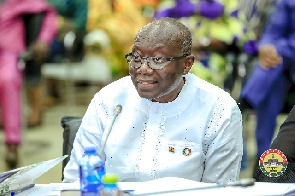The US$3 billion extended credit facility deal with the International Monetary Fund, once agreed by the board of the Bretton Woods institution, will help Ghana restore economic stability, tackle inflation and strengthen the Ghana cedi, Finance Minister Ken Ofori-Atta has said.
Addressing Journalists at a press conference on Tuesday, 13 December 2022, following the staff-level agreement, Mr Ofori-Atta said: “Truly, the eventual conclusion of the program will assist us in our efforts to restore stability, tackle inflation, and strengthen our currency.”
“That is why the various ingredients of the programme should be supported by all Ghanaians and all stakeholders.”
The staff of the IMF and the Ghanaian authorities reached an agreement on economic policies and reforms to be supported by a new three-year arrangement under the Extended Credit Facility (ECF) of about US$3 billion.
The authorities’ strong reform programme is aimed at restoring macroeconomic stability and debt sustainability while protecting the vulnerable, preserving financial stability, and laying the foundation for strong and inclusive recovery.
To support the objective of restoring public debt sustainability, the authorities have launched a comprehensive debt operation.
In addition to a frontloaded fiscal consolidation and measures to reduce inflation and rebuild external buffers, the program envisages wide-ranging reforms to address structural weaknesses and enhance resilience to shocks.
An IMF team led by Mr Stéphane Roudet, Mission Chief for Ghana, visited Accra during December 1 – 13, 2022, to discuss with the Ghanaian authorities IMF support for their policy and reform plans.
At the end of the mission, Mr Roudet issued the following statement:
“I am pleased to announce that the IMF team reached a staff-level agreement with the Ghanaian authorities on a three-year program supported by an arrangement under the Extended Credit Facility (ECF) in the amount of SDR 2.242 billion or about US$3 billion. The economic program aims to restore macroeconomic stability and debt sustainability while laying the foundation for stronger and more inclusive growth. The staff-level agreement is subject to IMF Management and Executive Board approval and receipt of the necessary financing assurances by Ghana’s partners and creditors.
“The Ghanaian authorities have committed to a wide-ranging economic reform program, which builds on the government’s Post-COVID-19 Program for Economic Growth (PC-PEG) and tackles the deep challenges facing the country.
“Key reforms aim to ensure the sustainability of public finances while protecting the vulnerable. The fiscal strategy relies on frontloaded measures to increase domestic resource mobilization and streamline expenditure. In addition, the authorities have committed to strengthening social safety nets, including reinforcing the existing targeted cash-transfer program for vulnerable households and improving the coverage and efficiency of social spending.
“Structural reforms will be introduced to underpin the fiscal strategy and ensure a durable consolidation. These include developing a medium-term plan to generate additional revenue and advancing reforms to bolster tax compliance. This will help create space for growth-enhancing measures and social spending. Efforts will also be made to strengthen public expenditure commitment controls, improve fiscal transparency (including the reporting and monitoring of arrears), improve the management of public enterprises, and tackle structural challenges in the energy and cocoa sectors. The authorities are also committed to further bolstering governance and accountability.
“To support the objective of restoring public debt sustainability, the authorities have announced a comprehensive debt restructuring. Sufficient assurances and progress on this front will be needed before the proposed Fund-supported program can be presented to the IMF Executive Board for approval.
“Reducing inflation, enhancing resilience to external shocks, and improving market confidence are also important program priorities. Accordingly, the Bank of Ghana will continue to strengthen its monetary policy framework and promote exchange rate flexibility to rebuild external buffers. As part of the authorities’ debt strategy, a domestic debt exchange has been launched. The authorities are committed to taking the necessary mitigation measures to ensure financial sector stability is preserved.
“IMF staff held meetings with Vice President Bawumia, Finance Minister Ofori-Atta, and Bank of Ghana Governor Addison, and their teams, as well as representatives from various government agencies. The IMF team has also continued to engage with other stakeholders. Staff would like to express their gratitude to the Ghanaian authorities, Parliament’s Finance Committee and all the private sector, trade union, and civil society representatives for their open and constructive engagement over the past few months.”
Read Mr Ofori-Atta's full speech below:
I will like to first of all thank the almighty God for providing the needed guidance to the GoG and the Fund to get us where we are today.
ii. I will also like thank HE the President for his leadership and direction throughout this period;
iii. Let me also express appreciation to the IMF in general and in particular the IMF MD and management, Stephane Roudet, IMF Mission Chief to Ghana and Leo Medina, and the indomitable spirit of the team for their commitment to Ghana during these challenging times;
iv. In addition, I will like to express appreciation to key stakeholders including Cabinet, Parliament, FBOs, CSOs, and members of Academia, for their invaluable contributions to the preparation of the Post-Covid-19 Programme for Economic Growth (PC-PEG) which has underpinned the IMF Programme negotiations; and
v. Last but not the least I will like to express my sincere appreciation to the staff of MoF and BoG’s leadership under Governor Addison and the trusted Deputies for their hard work and sacrifices throughout this entire process.
Context
i. A lot of work has gone on behind the scenes for almost 6 months when Government formally announced its intention to engage the IMF for an IMF-supported programme, to enable us reach this Staff Level Agreement (SLA) today which paves the way for the IMF’s Management and Executive Board to approve Ghana’s programme request early next year.
ii. Since the announcement on 1st July, 2022 to formally engage the IMF for an IMF-supported Programme, there have been three rounds of negotiations with the IMF interspersed with a number of virtual meetings in-between to ensure both the GoG and the IMF teams work around the clock to get the SLA by end Dec 2022.
iii. Against the backdrop of Staff Programmes, Ghana is indeed blessed to conclude our SLA within 5 months. This is historic in recent times relative to what we witnessed with Zambia, Chad and Ethiopia.
The IMF Programme
i. The GoG and the IMF teams have worked tirelessly to agree on key aspects of the IMF Programme at the Staff Level.
ii. Key deliverables over the period include:
a) Preparation of the Post-Covid-19 Programme for Economic Growth (PC-PEG);
b) A Medium-term macroeconomic framework;
c) Debt Sustainability Analysis (DSA) and Debt Management Strategy;
d) Structural reforms to address structural bottlenecks, improve competitiveness and promote efficiency and effectiveness;
a) Preparation of the Post-Covid-19 Programme for Economic Growth (PC-PEG);
b) A Medium-term macroeconomic framework;
c) Debt Sustainability Analysis (DSA) and Debt Management Strategy;
d) Structural reforms to address structural bottlenecks, improve competitiveness and promote efficiency and effectiveness;
i. Key fiscal measures, structural reforms, and the medium-term macro-fiscal framework in the 2023 Budget are aligned with the IMF-supported Programme. It is therefore crucial that we receive support from all stakeholders including:
a) Parliament to ensure that the 2023 budget including all revenue measures are passed; and
b) Creditors to ensure a successful debt operation
Truly, the eventual conclusion of the program will assist us in our efforts to restore stability, tackle inflation, and strengthen our currency.
That is why the various ingredients of the program should be supported by all Ghanaians and all stakeholders.
We can only get to the IMF Board if we get sufficient commitment from our creditors in support of the debt operation.
i. The 2023 Budget is anchored on increasing domestic revenue mobilization effort by 1.2 percentage points of GDP. On the expenditure side, the 2023 Budget proposes to reduce expenditures (on commitment basis) by about 2 percentage points of GDP from 2022 to 2023. Primary expenditures are expected to be reduced through a reduction in allocation on the Use of Good and Services and Domestically Financed Captial expenditure on a commitment basis.
ii. These fiscal adjustments alone are not enough to address the country’s economic challenges, hence the ongoing debt restructuring aimed at restoring debt sustainability in the medium-term.
iii. The 2023 Budget contains important social protection measures to support the most vulnerable including measures that seek to gradually increase the number of beneficiary households as well as the value cash transfers under the LEAP. Other social protection programmes which will be prioritised under the programmes include the NHIS, the Capitation Grant, and the School Feeding Programme.
Concluding Remarks
iv. We are optimistic that the 2023 Budget adjustment strikes the right balance between determination and pragmatism.
v. Already, the economy is responding positively to the news of GoG and the IMF reaching an SLA and we are eager to leverage this momentum to the very moment when the IMF Executive Board approves the Programme request. We are already seeing significant improvements in the exchange rate with the Ghana cedi recovering against major currencies.
vi. We hope that Ghanaians will continue to support all efforts to restore macroeconomic stability and promote robust and inclusive growth.
vii. We are confident as a resilient people, and we shall rally to support this great enterprise, to restore macroeconomic stability and promote robust and inclusive growth. The world is looking at us, and I know we can do it.
viii. To God indeed be the glory for the great thing he hath done within 5 months. I am certain that God who began the good work will continue until it is finally finished – Greater things He will do. For we shall gather the harvest with joy.
ix. These indeed are both times for a Joseph recovery and a Nehemiah rebuilding
x. Let us continue with courage, the spirit of love for each other and self-discipline to go through this together.
xi. Thank you and God Bless.
General News of Wednesday, 14 December 2022
Source: classfmonline.com

















